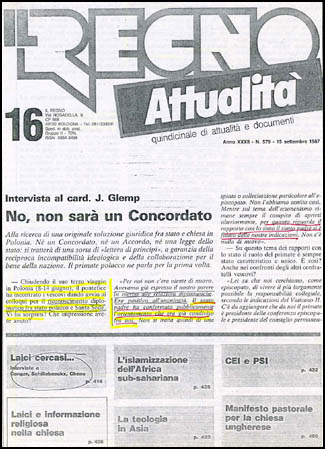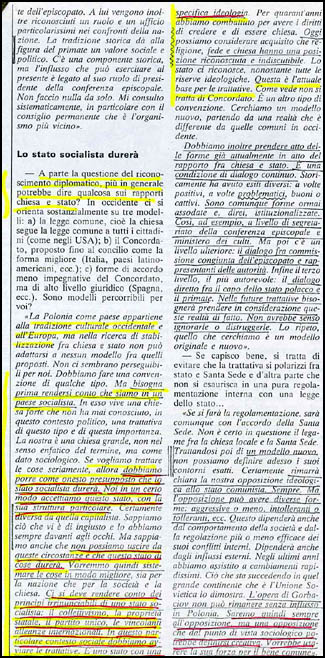In an interview granted to the Italian magazine Il Regno (September 15, 1987) Cardinal Josef Glemp, Primate of Poland, spoke on the relations between the Church and the Communist State. He had the public endorsement of John Paul II. In the interview, Glemp enunciated general principles followed by the Church that would later inspire the establishment of official diplomatic relations between the Holy See and the Communist regime.
Contrary to the myth that at that time the Church was against Communism in Poland, this interview reveals a very submissive Church willing to accept the principles of Communism in order to survive.
At right is the front page of Il Regno with the first part of the interview. Under it, the Italian text continues. Below, we present our translation of the lines highlighted in yellow.
Question - At the end of his third trip to Poland (June 8-14), the Pontiff met with the Bishops [telling them] to start meetings to establish diplomatic recognition between the Polish State and the Holy See. Are you surprised?
Answer - For us, there was nothing new in this .... The Holy Father publicly confirmed the policy that he had already shared with us ....
Question - Apart from the question of diplomatic recognition, could you explain in general the relations between Church and State?
Answer - As a country, Poland belongs to the Western and European cultural tradition .... But it is necessary to take into consideration that we are in a Socialist country. In it lives a strong Church that has never known, within this political context, an initiative of this type and importance.
Ours is a large Church as a sociological presence. If we want to deal with the situation seriously, then we should face as a honest presupposition that the Socialist State will last. In a certain way, we accept this State, with its particular structure. Certainly it is different from Capitalism. We know the injustices in it and we always keep these in view. But we also know that we cannot get out of these circumstances and that this state of things will continue. What we want, therefore, is to organize things in a better way for the nation, society, and the Church.
We must take into consideration the irrevocable principles of a Socialist State: collectivism, state property, a single party, and binding international alliances. This is the particular context in which we must have our discussions. It is a State with a specific ideology.
For 40 years we have fought to have the right to believe and be a Church. Today we can consider that religion, faith, and the Church have a recognized, indisputable position. The State recognizes her, notwithstanding all its ideological reservations. This forms the basis for the negotiations.
(Josef Glemp, interview granted to Lorenzo Prezzi titled, "No, non sara un Concordato" in Il Regno, September 15, 1987, pp. 409-410)
|

 |
